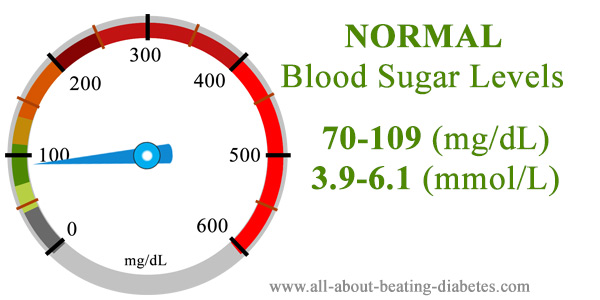- Home
- blood sugar levels
- level 70 109
Blood sugar level 70-109 mg/dl (3.3-6.05 mmol/l)
Blood sugar level 70, 71, 72, 73, 74, 75, 76, 77, 78, 79, 80, 81, 82, 83, 84, 85, 86, 87, 88, 89, 90, 91, 92, 93, 94, 95, 96, 97, 98, 99, 100, 101, 102, 103, 104, 105, 106, 107, 108, 109 mg/dl is considered normal.
People that have blood sugar level within this range are perfectly normal, although they should have their blood sugar checked at least once a year to check that they have not developed type 2 diabetes.
People suffering from diabetes, have abnormalities in the production or secretion of insulin.
When your blood sugar was tested...
 Fasting Fasting |
 After Eating After Eating |
 Medication Medication |
To keep their blood sugar levels within the normal ranges, they should take some lifestyle changes, such as eating a healthy diet, exercising and losing weight.
What does having blood sugar level between 70-109 mg/dl mean? How can it be achieved?
Blood sugar level 70 - 110 mg/dl (from 70, 71, 72, 73, 74, 75, 76, 77, 78, 79, 80, 81, 82, 83, 84, 85, 86, 87, 88, 89, 90, 91, 92, 93, 94, 95, 96, 97, 98, 99, 100, 101, 102, 103, 104, 105, 106, 107, 108, 109 mg/dl) is considered normal.
This means that you do not have diabetes currently, but this does not mean that you are not at risk of developing it at some point of your life, especially if you have a positive history of diabetes in your family.
The most accurate measurement is a fasting blood sugar, done early in the morning before you have had anything to eat or drink. Fasting for at least 8 hours is necessary for a reliable test result.
In people who do not suffer from diabetes, the blood sugar regulation mechanism is optimal. This means that their blood sugar will stay within the normal ranges, no matter what they eat, or how many sugar-rich foods they take.
This is due to the normal insulin secretion: when eating the sugar level in the blood rises. This triggers the production and secretion of insulin from the pancreas, in order to neutralize the high levels of sugar.
This mechanism is affected in people suffering from diabetes, and, therefore, they have to be careful with what they eat.
Non-diabetic people can eat whatever they like. The only way these people can prevent diabetes is screening: measuring their blood sugar level from time to time, in order to catch in time any rise tendency of blood sugar. Early screening allows early treatment.
How can diabetic people achieve a 70-109 mg/dl blood sugar level?
Diabetic people have low insulin secretion( Type 1 diabetes) or inability of insulin to bound with its receptors in the cells( Type 2 diabetes). Either way, their ability to secrete insulin depending on the variation of their blood sugar is compromised.
Diabetes is a very dangerous disease. In time, it affects the eyes, the heart, the kidneys, the arteries and the nerves, among other organs. Keeping blood sugar level 70-100mg/dl, which is the normal range, is the nr.1 priority of every diabetic person.
There is some easy tips and lifestyle changes to keep blood sugar level within normal ranges:
1. Dietary changes:
A healthy diet for diabetic people consists of a diet rich in vegetables, fruits, whole grains and legumes, and a reduction of saturated foods.
2 .Losing weight.
If overweight, losing only 7% of your body weight will significantly improve the levels of the blood sugar.
3. Physical activity
Regular exercise can help people suffering from diabetes, maintain a better blood sugar control.
At least 30 minutes of moderate exercising most days of the week( brisk walking, swimming, playing a favorite sport etc) is recommended.
A combination of aerobic exercises( walking or dancing) most days of the week, combined with resistance training( weightlifting or yoga) once or twice a week often help control blood sugar more effectively than does either type of exercise alone.
There are also a broad range of substances that have shown experimentally to stimulate the regeneration of beta cells (which are affected in type 2 diabetes) and, thus, helping diabetic people keep blood sugar level 70-110 mg/dl. Following are some of these substances:
Arginine, avocado, corn silk, chard, curcumin, honey, stevia, nigella sativa, genistein etc.
How to prevent diabetes?
Type 1 diabetes cannot be prevented. It is a genetic disease.
Some lifestyle changes that treat prediabetes can help in preventing the development of type 2 diabetes.
1. Eating healthy foods- choose foods rich in fiber and vitamins, and low in fat and calories. Focus on vegetables, fruits, and whole grains.
2. Get more physical activity- Get at least 30 minutes of moderate physical activity most days of the week. Try walking, swimming, riding a bicycle etc.
3. Lose excess pounds- if you are overweight, losing even 7% of your body weight would significantly reduce the risk of diabetes.
Written by Dr.Albana Greca Sejdini, Md, MMedSc
Medically reviewed by Dr.Ruden Cakoni, MD, Endocrinologist
Diabetes complications Questions or Problems? Get Help Here
This is the place where you can ask a question about any aspect of diabetes complications.
It's free and it's easy to do. Just fill in the form below, then click on "Submit Your Question".
